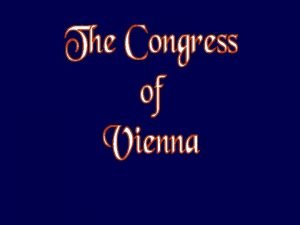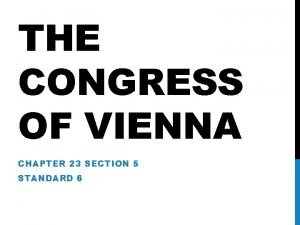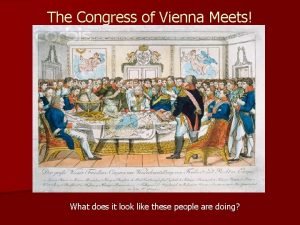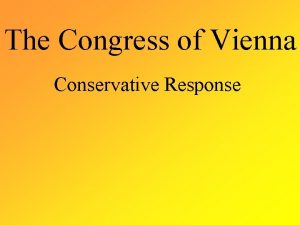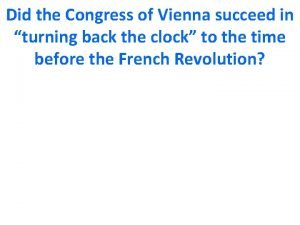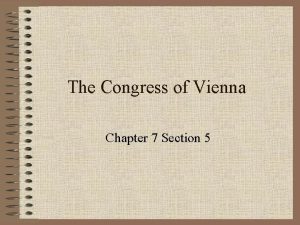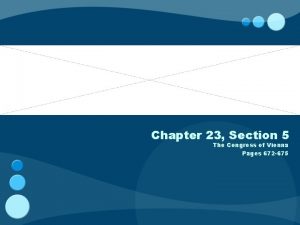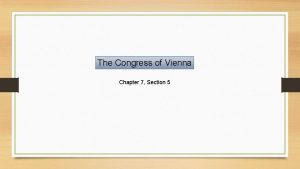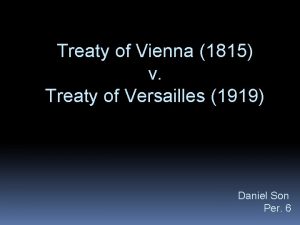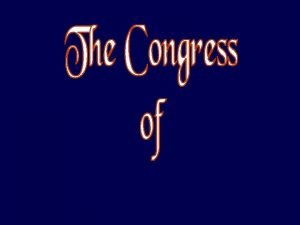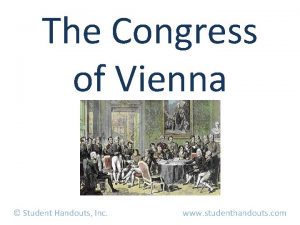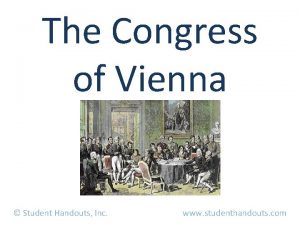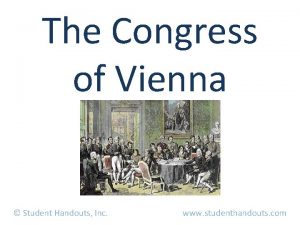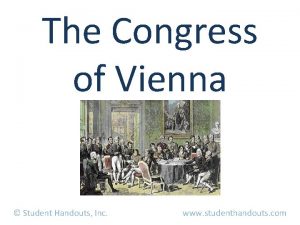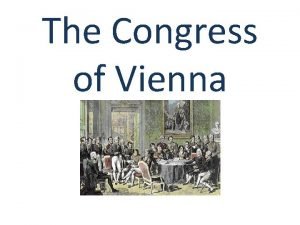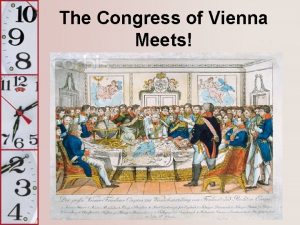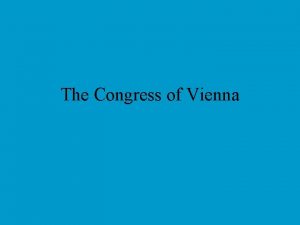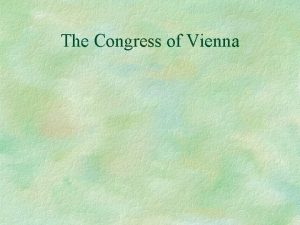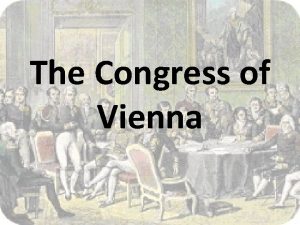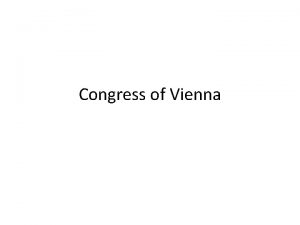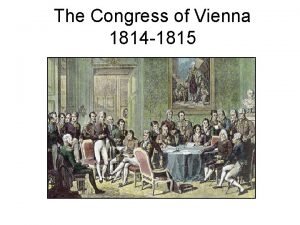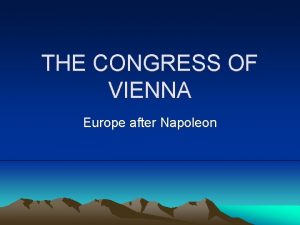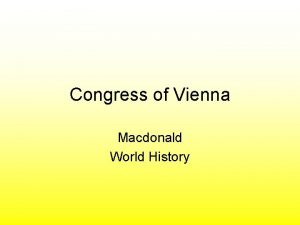The Congress of Vienna Student Handouts Inc www
















- Slides: 16

The Congress of Vienna © Student Handouts, Inc. www. studenthandouts. com

Congress of Vienna (1814 -1815) • European monarchs sought to turn back the clock to 1789 and restore Europe’s Old Regime • Members included the “Big Four” and France – Austria – Prince Metternich – England – Duke of Wellington and Lord Castlereagh – France – Talleyrand – Prussia – Frederick William III, Hardenberg, and Humboldt – Russia – Tsar Alexander I

Metternich (1773 -1859) • Opposed democracy and nationalism • Proposed principles of compensation and legitimacy

Compensation and Legitimacy • Compensation – Napoleon’s enemies rewarded with land – Other nations compensated for land taken – Redrew the map of Europe • Legitimacy Restoration of pre-Napoleon rulers House of Bourbon – France, Spain, and the two Sicilies House of Braganza – Portugal House of Orange – Netherlands House of Savoy – Sardinia German princes – territories in the Confederation of the Rhine – Pope and Catholic Church – Papal States – – –

Territorial Changes • Austria gained Lombardy, Modena, Parma, Tuscany, and Venetia (all areas in Italy) • England gained Cape Colony, Ceylon, Heligoland, Guiana, and Malta (areas in Africa, the Americas, and Asia) • Holland gained Austrian Netherlands (Belgium) • Prussia gained part of Poland, land along the Rhine River, 40% of Saxony, Swedish Pomerania, and Westphalia • Russia gained Finland part of Poland • Sweden gained Norway

Fate of Nationalism • People had no say over territorial changes • Language, nationality, and religion weren’t taken into consideration • Ideas of democracy and self-government were rejected by European leadership • Soon enough, concessions were made

Louis XVIII of France • No more divine right of kings • Charter (Constitution) granted in 1814 • Could not restore feudalism and serfdom • Continuing religious toleration guaranteed

Buffer States • Designed to prevent France from again becoming a threat • Holland Sardinia enlarged and strengthened • European nations guaranteed Switzerland’s neutrality

Quadruple and Holy Alliances • Metternich desired to maintain the status quo and make the Vienna treaties permanent • Quadruple Alliance of 1815 – Austria, England, Prussia, and Russia – France joined in 1818 – Pledged to put down democratic or nationalistic revolts • Holy Alliance – Organized by Tsar Alexander I of Russia – Most European monarchs joined – Pledged to govern with charity, justice, and peace • But none of them did so

Results of the Congress of Vienna • Concert of Europe – group of leading nations which periodically met to discuss issues regarding stability • The Concert would protect the Status Quo at all costs • Austria was especially fearful of nationalism • Temporary suppression of democratic and nationalistic ideals • International peace – no general war in Europe until World War I a hundred years later – Crimean War (1854 -1856)

Restoration Europe

The Return of the Estates • Many nobles were restored to their previous levels of power • Many traces of the French were taken down by their occupied countries • The Pope regained power again • As before the farther east you went, the more powers the nobles have • A religious revival also occurred throughout Europe

Conservative Belief • Conservatives believed that only through gradual growth and legitimacy in religion could a state emerge • Most conservatives saw no difference between reform and revolution • However, some change occurred such as the charter in France or the bureaucracy in Austria

Romanticism • Romanticism emphasized emotion in personal development • Poetry became more common with famous poets like William Wordsworth • Even fainting became popular to show ones true emotions • Romantic writers at first supported the French Revolution, but then turned against it when the revolution became violent • Romanticism is often very religious, evoking

Romanticism • Romanticism also helped bring about German and Italian nationalism • Both religion and nationalism were seen as a rejection against the Enlightenment rational tradition • Believed in the idea of the “heroic genius” • Many were loners “nobody understands my genius!” • Romantic paintings often showed man's helplessness in the face of nature, the all

Romanticism • Romantics believed music would release emotion and be a “window to the soul” • Ludwig von Beethoven was the most famous of these musicians
 Student handouts inc
Student handouts inc Www.studenthandouts.com
Www.studenthandouts.com Student handouts inc
Student handouts inc Lte
Lte Congress of vienna worksheet
Congress of vienna worksheet Congress of vienna map before and after
Congress of vienna map before and after Chapter 23 section 5 the congress of vienna
Chapter 23 section 5 the congress of vienna Congress of vienna quiz
Congress of vienna quiz The congress of vienna meets
The congress of vienna meets Congress of vienna conservatism
Congress of vienna conservatism Political wish new
Political wish new Chapter 23 section 5 the congress of vienna
Chapter 23 section 5 the congress of vienna Chapter 23 section 5 the congress of vienna
Chapter 23 section 5 the congress of vienna Chapter 23 section 5 the congress of vienna answer key
Chapter 23 section 5 the congress of vienna answer key Chapter 7 section 5 the congress of vienna
Chapter 7 section 5 the congress of vienna Treaty of versailles 1815
Treaty of versailles 1815 Chapter 23 section 5 the congress of vienna
Chapter 23 section 5 the congress of vienna





